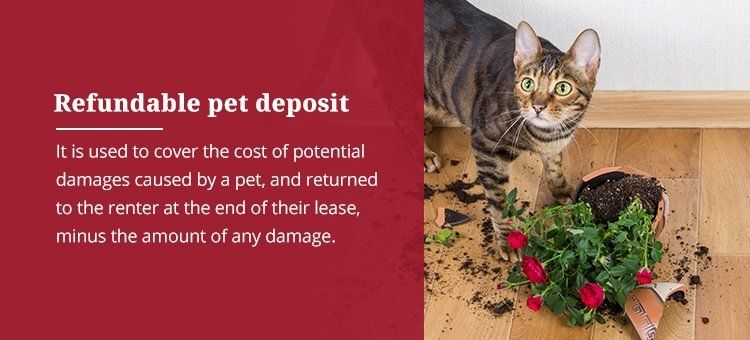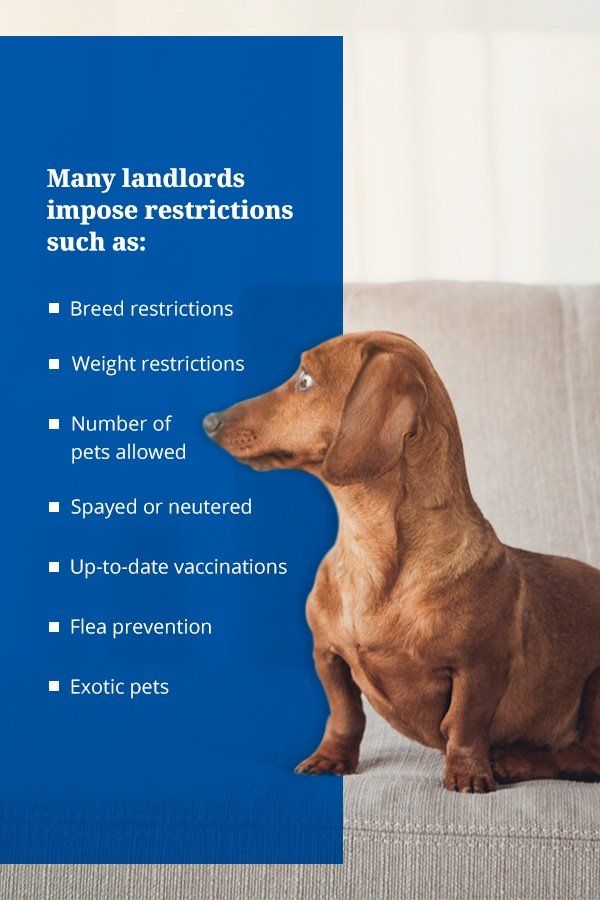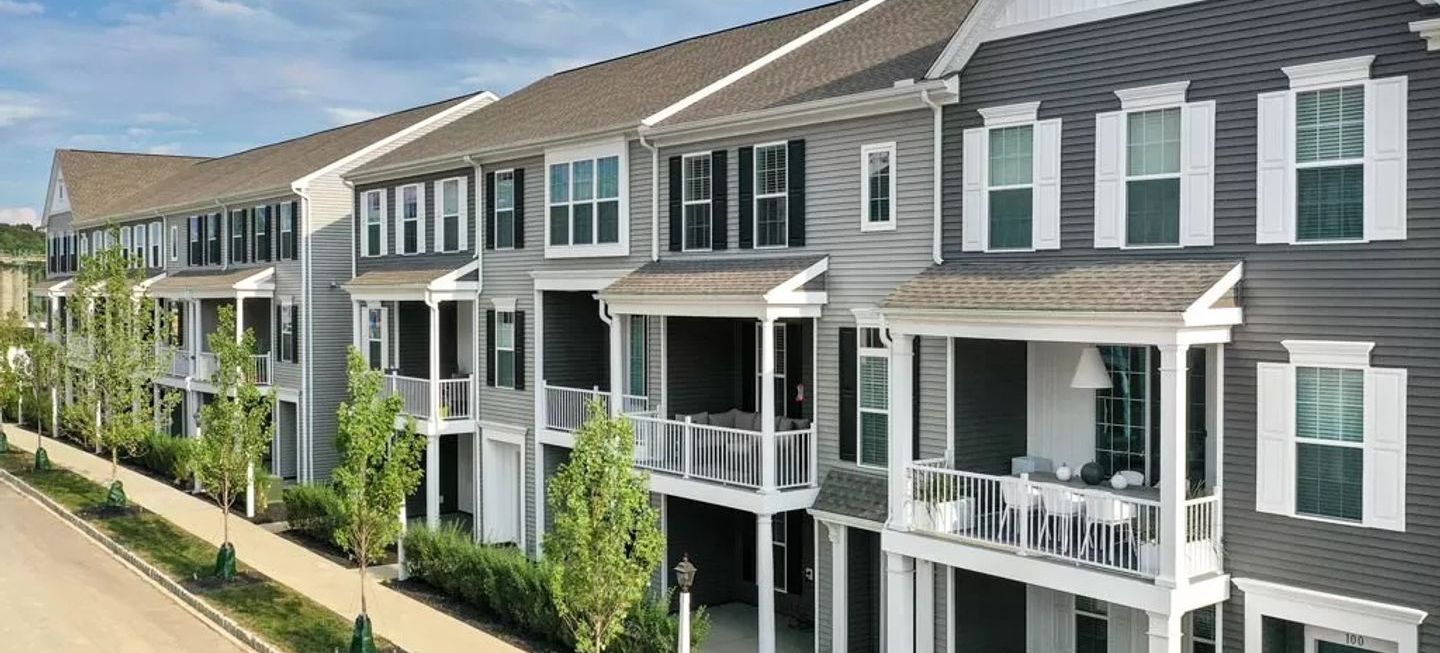Should I Allow Pets In My Rental? | Property Management
Guide to Landlord and Tenant Rights
Pros of Renters With Pets
Larger Selection of Potential Applicants
Nearly 49 million American households have a pet . When you choose to operate a no-pet property, you eliminate a considerable number of potential, high-quality tenants. For many prospective renters, a no-pet policy may be the difference between securing a home or not. In some cases, this results in a pet being abandoned or surrendered to a shelter . By offering a pet-friendly rental, you can market your property to a larger pool of applicants and help to keep pets out of shelters.
Better, Happier Tenants
Tenants who go through the process of having their pet approved for move-in — including paying pet deposits, fees, providing current vet records, pet interviews, etc. — demonstrate a significant level of responsibility. Their attentiveness toward these actions may be an indication of a better quality tenant. Additionally, if a tenant takes good care of their pet, it is a good indicator that they will probably take good care of your property, too.
Having a pet also makes tenants happy. Renters will appreciate not having to choose between renting closer to their work or school and keeping their beloved family pet. Additionally, studies suggest owning a pet can promote happiness and good health within pet owners.
You May Be Able to Charge More
Tenants May Stay Longer
Finding a pet-friendly rental can be a challenge for renters. One study found that only 9% of available rental housing allows pets without any significant limitations . Once a tenant moves into your property, they will likely stay for as long as they can to avoid having to find another pet-friendly rental in your area. The same study found that pet owners with legal pets — meaning pets they are allowed to have, rather than secret pets at non-pet-friendly properties — had a longer tenancy than renters at non-pet properties.
Decreased Chance of Secret Pets
Cons of Renters With Pets
Increased Risk of Property Damage
- Bite or scratch marks on the walls or trim.
- Broken window blinds.
- Chewed carpet.
- Scuffed or scratched flooring.
- Clogged plumbing from baths.
- Scratched or scuffed doors.
- Lingering odor or allergy-inducing dander.
Potentially Aggressive Pets
Pet Waste
Disturbance to Non-Pet Owners
Pet Odor
Tips for Managing a Pet-Friendly Rental
Have a Thorough Screening Process
- How old is your pet?
- Do you have a vet?
- Is your pet spayed or neutered?
- Has your pet had any obedience training?
- What breed is your pet?
- What do you do with your pet when you leave your home for the day?
- Has your pet ever lived in a rental before?
- Does your pet have any history of aggression?
- Is your pet on any current flea and tick prevention methods or undergoing treatment?
Check Rental References
Require a Pet Deposit
- Refundable pet deposit: A refundable pet deposit is similar to any other damage deposit you collect from your renters — it is used to cover the cost of potential damages caused by a pet, and returned to the renter at the end of their lease, minus the amount of any damage.
- Nonrefundable pet fee: A nonrefundable pet fee is not the same thing as a deposit. Essentially, this is a one-time fee renters pay for having a pet in their home.
- Additional pet rent: In lieu of a pet deposit or fee, some landlords prefer asking renters for additional pet rent each month.
Have a Clear Pet Policy in Place
- Cleaning up after pets, i.e., dog waste.
- Excessive noise and quiet hours.
- All limits and restrictions regarding breed, weight and number of pets allowed per unit.
- Any flea prevent and vaccination requirements.
- Established rules regarding pets in common areas.
- Rules regarding pets being tied or left outside in dog boxes or on long cables.
Consult Your Insurance Policy
Require Renters Insurance
Consider Restrictions and Limitations
- Breed restrictions: Some insurance companies and landlords have breed restrictions in place for dogs. Commonly restricted breeds include pit bulls, rottweilers, Akitas, Dobermans and Great Danes. Please note, breeds are not always an accurate indicator of personality.
- Weight restrictions: Many landlords implement weight restrictions in their pet policy. For many, this is a way to ensure only small, easily manageable pets are on the property. Other times, this is to prevent heavier pets from creating too much noise in an upper-story apartment.
- Number of pets allowed: Most rentals allow up to two pets. Choose a number that makes sense for the size of your property.
- Spayed or neutered: Some landlords require all pets to be spayed or neutered before move-in to prevent unplanned offspring, indoor spraying, territory marking or dominant behaviors.
- Up-to-date vaccinations: You might consider including a section about maintaining up-to-date vaccinations in your pet policy. This will help protect other renters and pets from infection or disease. This should be a top priority if you plan to provide a communal pet area, like a dog park.
- Flea prevention: Requiring renters' pets to be on a flea treatment and prevention routine will minimize the risk of bringing fleas and ticks inside the rental or from spreading to other renters' pets.
- Exotic pets: "Pets" can go beyond cats, dogs or even goldfish — when putting together your pet policy, consider your stance on exotic pets. Exotic pets may include snakes, spiders, reptiles, birds or other less common pets.
Make Your Property Pet-Friendly
- Provide pet waste stations: If you own an apartment complex, install pet waste stations throughout the property. Pet waste stations consist of a pet waste bag dispenser and a small trashcan. These stations make it convenient for renters to clean up after their pets during walks.
- Consider installing a pet wash area: A pet wash area is a great idea for complexes with several pet owners. Pet wash areas not only make your rental more appealing to pet owners, but they can spare residential plumbing from damage caused by excessive pet hair during bath time.
- Make sure there are plenty of grassy areas: Grassy areas are essential for dog-friendly rentals. Dogs need outdoor space to walk, exercise and use the bathroom. Grassy areas also minimize dog's using the bathroom on or near sidewalks or other structures.
- Use durable flooring: When constructing or renovating your pet-friendly rental, install durable flooring. Choose something similar to vinyl or laminate that does not attract pet hair or odor and is easy to clean in case of pet accidents.
- Designate an enclosed play area: Dog parks are not essential, but they are a huge selling point for many pet owners looking for a pet-friendly rental. Plus, providing an enclosed pet park for dogs to run and play in will help minimize pet boredom — which, in turn, may limit excessive barking.
- Provide renters with a list of pet resources: To encourage your renters to be responsible pet owners, consider compiling a pet packet to give them at move-in. In this packet, provide contact information for local veterinarians, pet groomers, pet stores, emergency services, obedience trainers and more.
- Keep your renters informed about visitors: Even friendly, well-behaved dogs can become anxious when strangers enter their home. To keep your staff and renters safe, do your best to inform renters when you will be entering their home for routine maintenance or other issues. This way, the renter can take steps to make sure their dog is crated or away from the home.
Remember Fair Housing Laws
Include Pets in the Lease
What Is a Pet Addendum?
How to Add a Pet Addendum to Your Lease
- Include all important information in the addendum, including regulations, requirements, restrictions, fees, rent amount and deposits.
- Sit down with each tenant and go over the addendum together to ensure a full understanding on their part and answer any questions they may have.
- Negotiate change when necessary, such as if a tenant's pet becomes a nuisance or when a renter who moved in without a pet wants to adopt a new animal.
- Make sure tenants understand the consequences of breaking the rules outlined in the pet addendum.
- Retain a copy for your records and make sure your renter has a copy for their use.

















